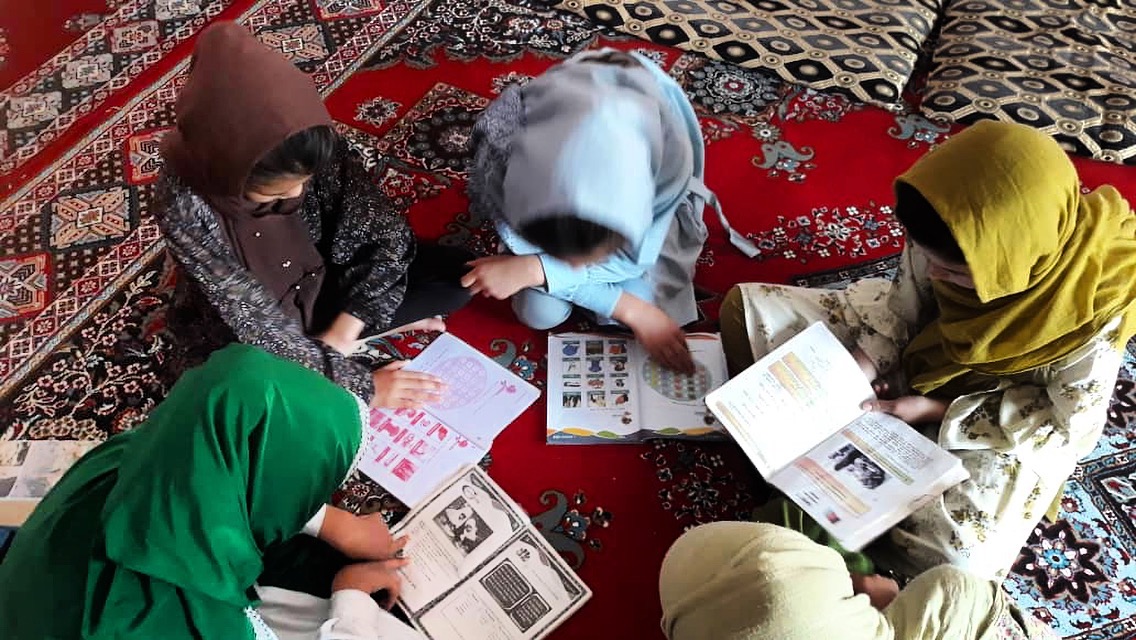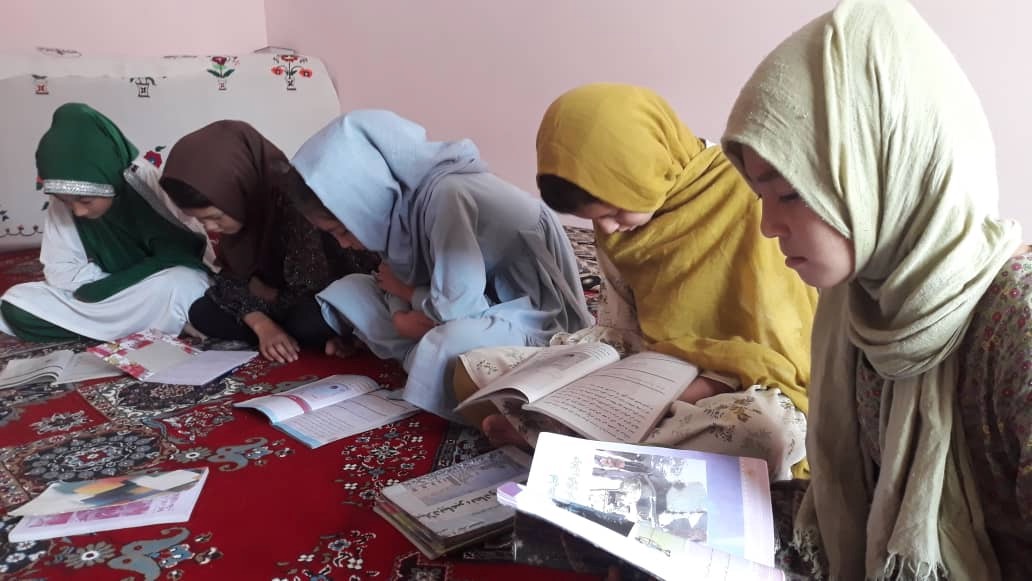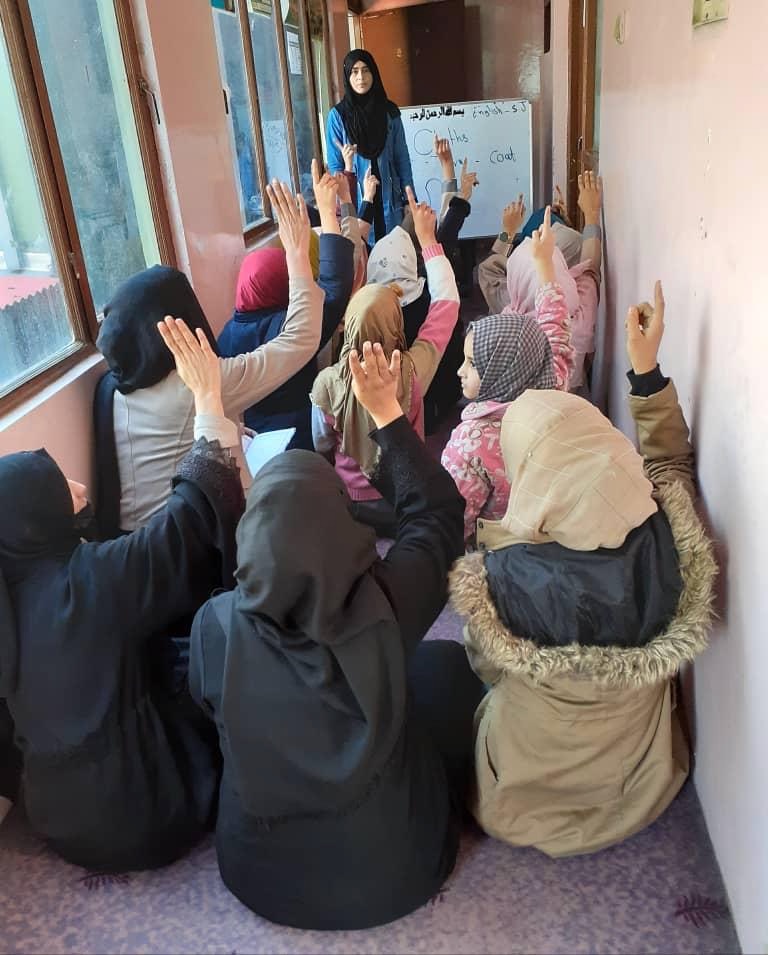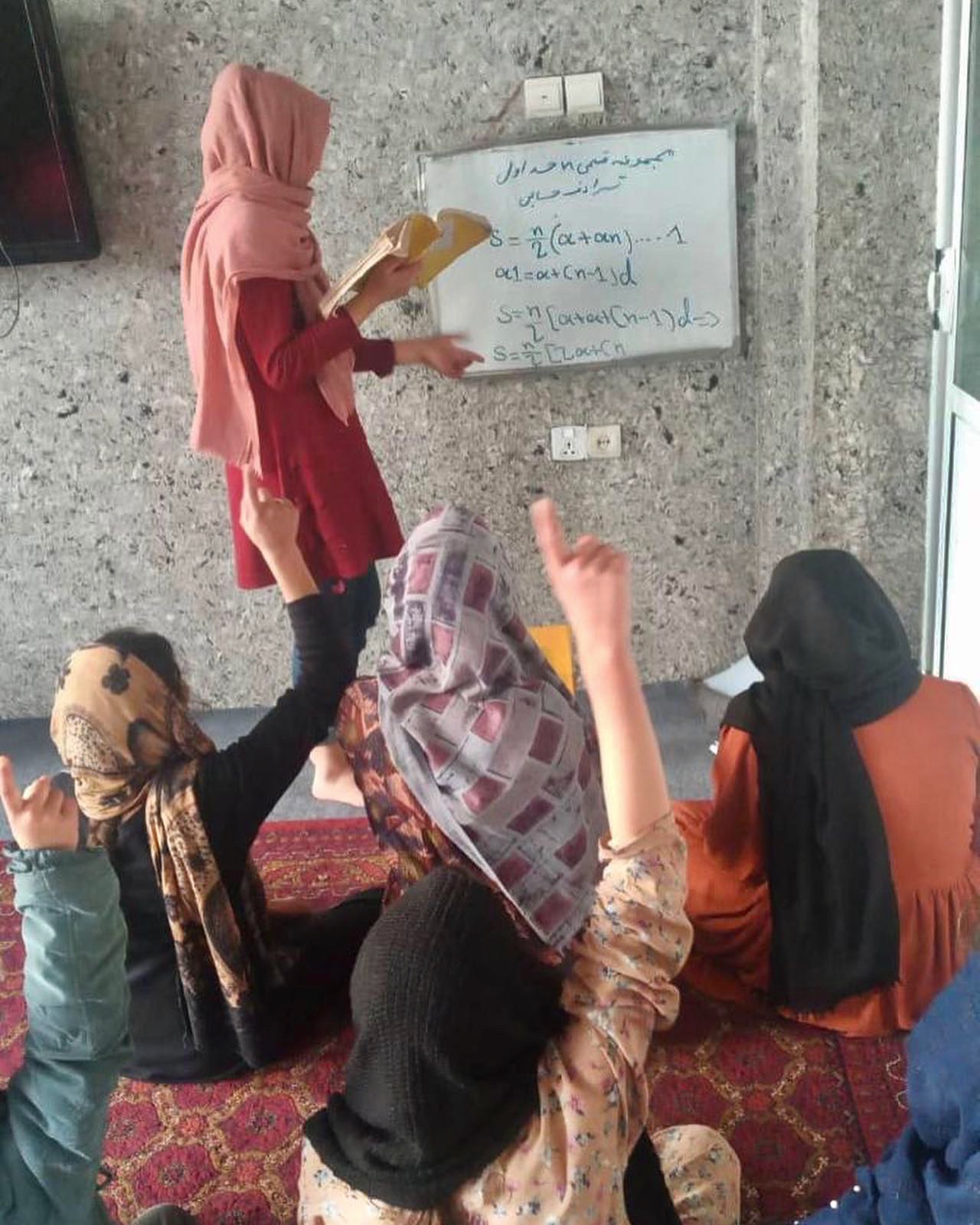The secret girls'schools in Afghanistan

Context:
Since the Taliban returned to power in Afghanistan on August 15, 2021, girls' education beyond elementary school has been banned, despite their promises. Although the level of schooling over the past 20 years was far from adequate, in the cities, the presence of schools allowed a generation of girls to complete their schooling, going on to university and begin a professional career. All this was stopped overnight, much to the sheer horror of the girls concerned.
Gradually, other basic have been curtailed: since December 21, 2022 access to university has been curtailed, which implies the prohibition of taking entrance exams to higher education. In January 2023, the ban on women working for NGOs was enacted, and in April it was extended to UN agencies, those that guarantee a minimum of health care and food aid, especially as the vast majority of medical structures are financed by international NGOs.
Add to that the ban on public spaces, including parks, streets and the countryside, the overall effect has been disastrous on the morale of young girls in particular. According to United Nations estimates, suicides occur on a daily basis, and forced child marriages and the sale of children have increased. Today, 97% of the population lives below the poverty line, to which the repeated droughts, insecurity and the freezing of Afghan bank assets have of course contributed.
Despite the harshness of the Taliban's measures, there is every indication that families want their daughters to continue their education, and the girls themselves are particularly keen on it.
Social progress depends on the education of women, as the development of neighbouring Iran has shown. Within a year and a half of Taliban rule, Afghan society has collapsed in terms of human rights, education (including that of boys), trade, infant and maternal mortality rates have risen dramatically, famine has set in, and the already ubiquitous violence against women has spread to all levels of society.
What makes our project unique:
It is estimated that there are approximately 10,000 clandestine girls’ schools of varying levels throughout Afghanistan. Teachers are paid if the families of the pupils can afford it. The curriculum sadly remains unequal
From 6 schools in October 2021 with about 70 pupils, we now have 148 teachers who teach 2258 female pupils, associated since February with those of Nayestane, all operate in the same way, replicating the secondary school cycle with recuperated textbooks: the teachers are all paid directly and regularly, the pupils, take exams, and their attendance and absences are monitored. Through our schools, we seek not only to maintain schooling at the level it has been for the past twenty years, but also to continue to train teachers in human rights, with online lectures and English classes. We hope that our approach can spread throughout the country, raising the level of non-formal education.
We have created two series of projects: 1. E-leaning for high school and university girls and 2. E-leaning for high school girls and college girls.
Nevertheless, for the students without means (the vast majority) a free solution had to be found. E-learning is not a solution for schoolchildren: in addition to the high price of subscriptions and electricity, the youngest do not have a cell phone, reserved for their older brothers. The clandestine teaching method we have chosen is inspired by the one used by women during the first Taliban reign in the 90s. Of course, this work is not devoid of risks.
FOR MORE DETAILS WATCH the interview of Carol Mann (Director of FemAid) with Solène Chalvon for Public Senat, March 28, 2023.
And the interview in Persian on Afghan International TV
Our team
With a founding committee composed of Afghans in exile, in particular Ibrahim Mateen (engineer), Rateb Noori (journalist), Sahra Noori (chemist) and Lutfia Atay (translator), we have set up a project that includes both clandestine courses in Afghanistan and the Afghan University in Exile. Each of the founding members remains very active in the project.
Expected results and indicators:
As girls' schooling has been banned since the resumption of Taliban rule, there is an urgent need to save the future of the young generation as well as that of their teachers now out of work. The demand is enormous but the project can only be realized by recruiting teachers one by one in the greatest discretion.
Since February 2023, we are associated with the Nayestane a French charity with the same aims and we have joined our forces and our teachers for more efficiency!

Secret classes for girls in Afghanistan
Pedagogical and organizational director: Lutfia Attay
Beneficiaries
The clandestine courses are used to help secondary school girls deprived of schooling since the arrival of the Taliban and allow the families of the teachers to survive. We started in October 2021 with 5 female teachers to reach 22 one year later, thanks to the help we received on the way. Since April 5, 2023, we have 40 schools, including 3 in the region of Kandahar, the Taliban stronghold. In April 2023, we counted 1,200 students and 68 teachers.
Classes are held in many regions of Afghanistan, including remote areas (Badakhshan, Parwan, Helmand and since April 2023 Kandahar, (the stronghold of the Taliban) and some major cities Kabul, Kunduz, Baghlan,Charikar. The majority of courses are held in non-Pashtun areas where the Taliban presence is less felt. But the risks of course remain.
Our 2950 students (as of February 2024): Young girls, middle school and high school students, approximately 11 to 17 years old, the most threatened of all. In October 2022, there are between 15 and 25 pupils per class. They live in their teachers' neighbourhoods and can get to their classes fairly easily.

Our 148 teachers:
With the help of Afghan refugees in France, and depending on our budget, we were able to find female teachers who teach clandestinely to about 15-20 students each. From 6 teachers in October 2021, we have grown to 22 one year later and 148 in June 2023. Most of them have worked in schools before and follow the curriculum that was established by the previous government. We give priority to breadwinners and widows (two of them have five children each). All of them have lost their jobs and any other means of survival. They receive the students in their homes, in their courtyard or in a room separate from their living quarters.
In addition, our pedagogical director Lutfia Attay leads regular discussions on topics such as women's rights.
Henceforth, the teachers are all required to take (free) classes in English as they have to teach the subject. They will benefit from sessions with a psychologist as well
Teachers send reports, drawings and photos regularly through a WhatsApp group, t all those who support us can join.
Paying the teachers
The teachers are now paid 150€, the rent of the room they use is also paid. We add a bonus at the beginning of their teaching for school supplies and this winter, each receives a sum to pay for heating, especially since the winters are harsh.
Sending money is very difficult for political reasons and increasingly strict Taliban surveillance. Teachers’ pay is sent by systems such as Western Union or equivalent, depending on the possibilities, there is no intermediary. The costs of sending and exchange (always unfavorable for us) are around 10%.
However, with inflation, these sums have proven insufficient and since February 2023 we have doubled the budget allocated to each teacher and started English classes and conferences on human rights for the teachers
This is why we have joined forces with the Nayestane charity and we have been joining forces with our teachers since February 2023.
TESTIMONIALS REPORT AFTER A GROUP CONVERSATION WITH THE TEACHERS ON October 23, 2022

Because of the frequent power cuts and the high cost of internet in Afghanistan, we were only able to talk to ten teachers. For security reasons, we do not specify the names or the place where they teach. The translation was done by Lutfia who manages this part of the project. All told us that they are the main support for their families. They assured us that the demand was enormous, that the students and their families were very enthusiastic, which ensures them some protection. The majority of the courses take place in non-Pashtun areas where the presence of the Taliban is somewhat weaker. But the risks of course remain high. That is why each teacher always has a copy of the Koran at hand and every student brings some kind of sewing kit in case of Taliban interruption, which sometimes happens. At least two of them have put a sign on their door saying that "here a lady gives sewing classes for young girls".
One teacher (a widow and mother of three) told us: “One night, at around 3 a.m. I was ironing, as it was the only time there was electricity. Suddendly I heard screams in the street. I went to my window and saw that the Taliban had obviously killed a man. One of them noticed me and the group ran to my house and tried to break in. I refused to open the door, shouting 'There are no men here, only women, so if you want to come back , you have to come with your chief'. I rushed to hide all the school books and blackboard, but they didn’t return”
Problems/dangers encountered:
We asked them to describe the main problems they faced . If there is an intrusion by a Taliban militia, the teachers always have a copy of the Quran with them and say they provide religious instruction. Otherwise, each student has a sewing project at hand. Two of our teachers also give sewing lessons.
The level of the students is sometimes a problem: two teachers told us that despite their hypothetical middle school level, some of them still can’t read properly, which reflects the level of their previous schooling. This is why a refresher course is essential before starting the formal school program.
The teachers initially did not want to talk about the severe cold and lack of heating they suffer from. In fact, winters are so severe that schools are closed from January to March. With the increase in the price of fuel, families can barely afford to heat a room . In this ultra-patriarchal and conservative society, girls cannot be in the same room as men to whom they are not related, and female teachers need assistance if classes are to continue throughout winter. This is why we decided to subsidize firewood during the winter.
A STUDY OF STUDENT SATISFACTION IN NON-FORMAL CLASSES FOR GIRLS HELD IN KABUL FROM OCTOBER 2021 TO MAY 2023 (note: this text was written in English by its author with minimal corrections on our behalf)
The author:
My name is Khoshbo, I am 23 and a graduate of economics faculty from Kabul University. I was born in an enlightened family where, girls' education is very valuable, especially as my mother is a teacher as well. As a result, I have become diligent and work hard.My aim is to be self-sufficient, that's why I studied to create a good future for myself and my family. Since I was a child, I wanted to have a job to help women. Femaid and Nayestane gave me the opportunity to get closer to my goalI want to improve and I work hard for my goal I just need support
Abstract
Because of the importance of education, we need to know, as teachers, how our student appreciate our wor .It is important therefore to have them evaluate the quality of the teaching they receive. This is why I have chosen to investigate the students' satisfaction with my own teaching method. My students and myself thank our supporters Femaid and Nayestane for providing education for the suffering girlsof Afghanistan Keywords:Education,teachingmethod,studentsatisfaction
Introduction
Education holds an important position in the development of each human individual and the whole society and can be the driving forceof life.The educated class of our society can promote the country for years and generations to come and promote social, cultural, economic and political development. Teaching therefore means entrusting knowledge to others.The purpose of education is to help students master and increase knowledge, abilities and skills to use it in daily life, but also enact change. UNESCO has defined different types of education like formal education, non-formal education,continuous education and implicit education
Non-formal education is a type of education that is outside the formal system and this is what we have been doing with our female students thanks to the aid and support we have received. Women form half of the world’s population and their importance is greatest of all as they educate not only themselves but both halves of human society. We know that education not only empowers women but helps them educate and build the next generation of strong and healthy citizens. Because of the political developments in my dear country of Afghanistan since August 2021, women here face severe and unfair gender-based inequality and injustice. This has become the main obstacle and has stopped their education and participation in all areas of life. Despite this, I still believe that by improving the knowledge-level of girls, we can change and improve our society and achieve the development of our country. My purpose in conducting this survey is to contribute to the improvement of women’s education by finding out about my students' satisfaction with my teaching method.In this research, descriptive and inferential methods and SPSS software have been used for the analysis of the primary data .The research concerns 60 female students in the seventh and eighth grades living in the outskirts of Kabul in 2023, but the sample size here is 40 students.
Research Methodology
Methodology I submitted a questionnaire to the students with 33 questions and its scoring was from 1 to 5 (top mark).questions related to student satisfaction ,11 questions about the teacher, 6 homework 10related questions and 6 questions are about facilities.Characteristics of respondents:the distribution of the respondents is based on age, grade, year of leaving school. Characteristics of respondents by grade
Class of student
Frequency
%
Valid %
Cumulative%
7. grade
20
50.0
50.0
50.0
8. grade
20
47.5
47.5
97.5
Total
40
100.0
100.0
This table shows that 39 students participated in the survey. 20 students are grade seven and 19 students are grade eight
Characteristics of respondents by age
age
Frequency
Percent
12
7
17.5
13
8
20.0
14
7
17.5
15
3
7.5
16
5
12.5
17
2
5.0
18
5
12.5
20
1
2.5
Total
40
100.0
Characteristics of respondents by dropping out of school
Year of dropping out of school
Frequency
%
Valid %
Cumulative%
Valid
2021
27
67.5
67.5
2022
6
15.0
15.0
82.5
2023
7
17.5
17.5
100.0
Total
40
100.0
100.0
According to this table (based on my previous research) 27 students in 2021, 6 students in 2022 and 7 students in 2023 were deprived of education, that is were forced to leave the classes.
NOTE The situation is better in the capital because their families allow the girls to study, especially if they have educated mothers, the environment for girls' education is also favorable which is why most continue to attend my classes. Families care about girls' education especially when their daughters generate income for them In 2021, the new government closed all the girls schools, many girls have been pushed to marriage . There are many reasons for girls to drop out of school, including poverty, families' fear of the government system, and family problems etc but the main reason is marriage. This year, I had a student who got married and left our home school because her husband's father did not allow her to come here. Another one could not continue her studies due to pregnancy. But in the provinces girls hardly get primary education and marriage is very early, round 14. The main reason is culture and society's ideas about the place of women and girls. Primitive ideas and beliefs still prevail here. I went to my home province Kandahar, there the women told me that the school makes girls bad😥
Satisfaction with the teacher
87,8%: completely satisfied. 16,3%: satisfied. 4,3%:no opinion; 0,8%:dissatisfied; 1%: completely dissatisfed
NOTE: In general, I can say that the students are very happy because they are all being taken care of. We teachers try very hard.
According to the result obtained 93% students are satisfied with the teacher.
NOTE:In general, I can say that the students are very happy because they are all being taken care of. We teachers try very hard.
Accordingly to the results obtained 93% students are satisfied with my teaching.
CONCLUSION
In my personal opinion for girls, nothing is more important than studying and knowledge.
First, they manage their lives better, they defend their inalienable rights, they can be self-sufficient. If they are educated, they will not marry so early. Marriages of underage and illiterate girls lead to a lot of family violence. Illiteracy of girls keeps them under the control of their husband and their husband's family. The most dangerous phenomenon for girls is their ignorance.
Second women are an important part of the workforce for the development of each sector of our economy, we need different talents and different ideas.
If women do not study, these talents and skills will disappear. In this case, society stagnates: when the science centers were closed to female students we actually observed how the society led to economic and social stagnation.
Uneducated girls are the biggest supplier of combat power to the Taliban because when girls get married at a young age, the number of births increases and when the mother has little knowledge, her children can be misused and exploited.
I am really happy to work in the education sector because I fight for the girls of my land and for the opinions I hold.
Yes, education is the biggest resistance for freedom, for the progress of society, for gender equality
NEW HEALTH PROJECTS
In Afghanistan, medical studies are organized with theoretical instruction in the first years, followed by a year of practical experience in a hospital setting. The arrival of the Taliban has stranded a large number of female students at the end of their studies, deprived of the essential medical internship in the last year.
This is precisely where we can intervene by organizing a practicum s with hospitals. Here where the students can actually work, something the Taliban now allow, having realized the medical disaster that has followed their arrival to powe.
At the end of February 2023, we launched a pilot project to perfect the training of midwives in Afghanistan with the AMA, the Association of Midwives of Afghanistan. 12 apprentice midwives will complete their hospital internship under strict hospital supervision in Kabul's maternity wards for 4 months. This project will be renewed, especially since maternal and infant mortality is becoming catastrophic again as it was during the first Taliban period when maternal mortality was the highest in the world.
We plan to help train medical doctors as well a health issues are the main emergency in Afghanistan
For more details on the situation in Afghanistan and our project, see the interview with Solène Chalvon and Carol Mann, founder of FemAid on Public Senat, March 21, 2023
The (still precarious) state of our finances For 2021-2022, we were able to benefit from a grant from the DIAIR (French Government) and for 2022-2023 a grant from Raja Danièle Marcovici Foundation from France as well as a donation from a branch of Mothers for Peace. However, in view of the growing scale of this project, these grants are insufficient to pay our teachers and to satisfy the many requests. This is why we depend on your donations. Sales and charity meals are held to support our action.
To make a bank transfer, send an email to info@femaid.org
To make a donation on Helloasso
contact: info@femaid.org
100% of the money collected goes to finance our projects!